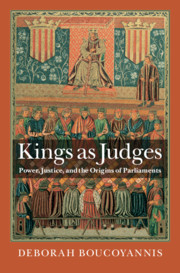‘This ‘remarkable book … challenges some of the more prominent arguments of historically minded social scientists (and some historians).’ It is ‘astonishingly wide-ranging … dizzying in its array of examples, thought-provoking and broadly persuasive over a wide geographical and temporal range.’ ‘Its target audience is political scientists’ but ‘it has much to offer historically too. The clarity and range of its thesis is unusual, and unusually impressive-there is a treatment of English constitutional development here that could be set alongside’ the work of ‘G.L. Harriss,’ ‘J.C. Holt’ ‘or George Garnett …. In all, the book is a wonderfully precise and sustained exercise in analysis, informed by wide reading and serious research.’
John Watts - Professor of Later Medieval History, Corpus Christi College, Oxford
‘This is a book of immense and stimulating breadth, providing a powerful argument for the importance of the administration of justice as a core aspect of the emergence of representative institutions. It will challenge historians to rethink their own fields of concentration in comparative fashion and will also bring historical scholarship and perspectives to the work of social scientists.'
John Hudson - Bishop Wardlaw Professor of Legal History, University of St Andrews, and L. Bates Lea Global Law Professor, University of Michigan
'Almost everything we have taken for granted about the historical sociology of constitutionalism is here shown to be wrong: the strength rather than the weakness of kings, and justice rather than taxation, did most to develop parliamentary powers. That this is so is powerfully demonstrated by exemplary comparative scholarship on western Europe on the one hand and on Russia and the Ottomans on the other. This is a masterpiece that will occasion debate, re-orient the field, and remain with us for an age.'
John A. Hall - Emeritus James McGill Professor of Sociology, McGill University
'In this powerful and learned work Deborah Boucoyannis retells the story of representative institutions in Europe, challenging much existing social science scholarship in this area. Rather than concentrating only on fiscal affairs, she shows us that to understand the emergence of representation, we need to look to the administration of justice, and how, when, and where it developed. This is a fascinating and highly original piece of scholarship.'
David Stasavage - Dean for the Social Sciences & Julius Silver Professor of Politics, New York University
‘This is a path-breaking, inter-disciplinary, and extraordinarily ambitious book, which seeks to explain how representative institutions first emerged. Boucoyannis constructs a compelling and innovative case for the processes of justice as the critical factor shaping representative emergence, where a central authority exercised control over the nobility while obligating local communities to participate in the provision of justice, which gradually transformed into a demand for rights. Boucoyannis’s grasp of both the social theory and the historical record is breath taking, and her arguments will require theorists and empiricists from various disciplines to reappraise fundamentally their interpretation of this important subject.’
Mark Bailey - Professor of Late Medieval History, University of East Anglia, and James Ford Lecturer in British History, University of Oxford
‘This is a brave and uniquely difficult book. Both adjectives imply warm commendation. Reading deeply into history and political theory, Dr Boucoyannis has dared to explicate a massive historical problem - the origins of western liberalism and constitutionalism - in theoretical perspectives so as virtually to reconceive a major field. For the problem she addresses is beset with a huge conceptual difficulty: how to reconcile the ever shifting pasts of human power with the more stubborn meanings of theoretical concepts: government, rights, law, representation, etc. Her novel results will repay careful study.’
Thomas N. Bisson - Emeritus Henry Charles Lea Professor of Medieval History, Harvard University
'It is commonplace to describe scholarly work as 'groundbreaking', but Professor Boucoyannis' book, and especially her chapter on Ottoman land law, really do merit this description. She is the first to notice the similarities between English land-law after the Norman Conquest and Ottoman land-law between the fourteenth and sixteenth centuries. Both legal systems made tenure on the land conditional, although it was the Ottoman system that gave control only, not ownership, of the land to the ruler. They had similar restraints on alienation and similar laws governing peasant land tenure. This chapter also demonstrates that the English crown wielded greater power than did the Ottoman sultans, thus undermining the old view that it was the 'arbitrary' rule of the sultans that prevented the emergence of representative institutions in the Ottoman Empire. The chapter is valuable in its own right, especially for historians studying the fundamental principles of the Ottoman laws of property and land tenure.'
Colin Imber - University of Manchester, author of Ebu’s-su‘ud: The Islamic Legal Tradition
‘This bold and ambitious book marries history and political theory to solve the riddle of why representative institutions emerged in the West, pre-eminently in England rather than elsewhere. The question is hardly novel, but the solution is...A short review cannot hope to encapsulate the breadth of treatment and the depth of reasoning in this remarkable book.’
Peter Coss
Source: Journal of Interdisciplinary History
'Boucoyannis develops an original and fascinating theoretical argument, centering on the role of powerful kings and their ability to call on their nobilities to gather in one location and deal with issues of justice. She also amasses a wealth of empirical evidence from a diverse set of countries … The book contributes with new knowledge on a host of important issues, such as the importance of including the nobility for building strong and viable institutions. Reading it was a great academic experience, and I have subsequently modified several of my prior beliefs about historical political development.’
Carl Henrik Knutsen
Source: Governance
'In a time when democratic principles and liberal orders are faltering and constraints on autocratic power are under attack, this study of their foundations provides valuable insight. Recommended.'
L. C. Attreed
Source: Choice



